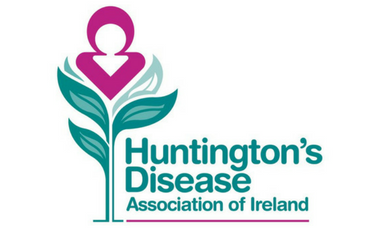Huntington’s disease (HD) is a complex neurological condition that is also hereditary. It “causes the progressive breakdown (degeneration) of nerve cells in the brain,” as stated by Mayo Clinic.
Over time a person living with Huntington’s disease can lose the ability to walk, talk, eat or manage their self-care. People can also experience emotional and mental health changes.
Huntington’s disease symptoms can develop at any time, but usually first appear when a person is between 30 to 50 years of age. If the condition develops before age 20, it is called Juvenile Huntington’s disease and symptoms are somewhat different to adult onset. When symptoms appear after the age of 60 years it is referred to as late onset.
Approximately 3500 people in Ireland are directly affected. It is estimated that 700 people currently experience disease symptoms and a further 2,800 carry the fatal gene.
Each child of a person with Huntington’s disease has a 50% chance of inheritance. Multiple members of a family may have the disease at the same time. There is a huge burden on family care givers who may often provide care for more than one family member. Huntington’s disease impacts upon entire families over generations.
What causes Huntington’s disease?
A defect in a single gene causes Huntington’s disease.
The DNA error that causes HD is found in a gene called huntingtin. The Huntington’s Disease Society of America states that “everyone has the huntingtin gene, but only those that inherit the mistake, known as the HD mutation, will develop HD and risk passing it on to their children.”
What are the symptoms of Huntington’s disease?
Huntington’s disease can cause a wide range of movement, emotional and psychiatric symptoms. It typically takes between 10 and 25 years from a person first developing symptoms until the end of life. There is currently no cure for Huntington’s Disease.
Movement
Movement or motor symptoms associated with Huntington’s disease include:
• Uncontrollable and involuntary movements or jerking (chorea), rigidity or muscle contracture (dystonia)
• Clumsiness, loss of coordination and stumbling
• Difficulty with speaking and swallowing
• Difficulty maintaining body weight
Thinking (cognition)
Cognitive symptoms associated with Huntington’s disease include:
• Difficulty organizing, decision making, multitasking or focusing
• Memory lapses, problems with thinking, impulsiveness and judgement
• Mood swings and irritability
• Slowness in processing thoughts or ”finding” words
• Difficulty learning new things
Psychiatric symptoms
People with Huntington’s disease can also experience a decline in mental health:
• Depression, apathy and social withdrawal
• Fatigue, insomnia and loss of energy
• Irritability, anxiety, obsessive behaviour
• Delusions, hallucinations and paranoia
• Frequent thoughts of death, dying or suicidal feelings.
“HD is an incredibly challenging illness for patients, carers, and healthcare professionals. Effective management requires appreciation of its many clinical manifestations. While HD is most recognisable by its movement disorder, the non-motor features are most challenging for patients and carers, especially early in the disease course. Executive dysfunction, memory impairment, altered attention, apathy, deficits in psychomotor speed, emotion processing, and visuospatial/ visuomotor integration are prominent, and may precede motor signs by years. Additionally, depression, anxiety and suicidality are common. Aggression, irritability, obsessive/ rigid thinking, and delusions may occur and require careful management.”
(Professor Niall Pender, Mr Colm Peelo, Dr. Sarah Darcy and Professor Orla Hardiman, Huntington’s Disease: An Overview in Medical Independent Clinical Neurology November 2020).
Treatment for HD
People living with Huntington’s disease require multi-disciplinary care to help manage symptoms.
According to The Medical Independent, “Patients require access to a neurologist, neuropsychologist, physiotherapist, occupational therapist, social worker, nurse specialist, dietician, speech and language therapist, psychiatrist, medical geneticist and palliative care. However, there is presently no HD MDT clinic in Ireland. Patients wait long weeks/months for services, travelling for hours to multiple appointments – an increasingly taxing endeavour.”
How can you help?
A Huntington’s disease diagnosis is very distressing, for the person diagnosed, their spouse/partner, siblings, children at risk and extended family relatives.
Due to the complex symptoms of Huntington’s disease, the fear of genetic discrimination and the rarity of the disease there is a severe lack of awareness and understanding of the disease.
You can help families impacted by volunteering/participating at events, donating or sharing Huntington’s disease related content on your social platforms – all will help raise awareness of this disease.
Donations and support for charities like Huntington’s Disease Association of Ireland (HDAI) is vital to patients and their families.
How Sunrise For Brain Conditions helps
Our annual events and fundraising go directly to registered Brain Condition charities, like Huntington’s Disease Association of Ireland (HDAI), to provide them with the much needed funds to support families affected by Huntington’s disease.
HDAI is a national charity which provides information and support to individuals and families impacted by Huntington’s disease. The Association works with national and international organisations to advance services and supports and promote research.
Our wonderful friends at HDAI have said that the Climb Up Croagh Patrick event has “been of vital assistance to HDAI over recent years and even more so in 2020, raising a magnificent €8,935.13 (net of iDonate fees)”.
Huntington’s disease has an enormous impact on a person’s physical, emotional, and cognitive functioning and severely impacts a person’s quality-of-life.
Help us support those suffering from Huntington’s disease by donating here.

